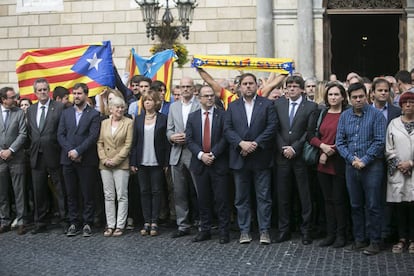Using Europe in vain
Brussels is resisting attempts by secessionists in Catalonia to have it intervene on the issue of independence

The Catalan executive, or Generalitat, has called for European mediation to resolve, in favor of independence for the region (with the excuses of the right to decide or police action on Sunday), its showdown with Spanish rule of law.
And soon the Generalitat will make the same request of other international organizations, hoping to achieve abroad – brandishing impressive and sad images – what it has failed to do at home, through political persuasion.
The petition to the EU is opportunistic in its formulation; it is clear that the plan is mere propaganda
It is an untimely call because this mediation doesn’t fit within the framework of the European Union’s Treaty of Lisbon, article four of which obliges all signatories to respect the territorial integrity and Constitution of all member states. And the call is cynical because the alliance that props up the Catalan government oscillates between indifference and hostility toward the EU.
The pro-independence Republican Left of Catalonia (ERC) party, one of the coalition partners in the Catalan government, carried out an aggressive campaign against the Treaty establishing a Constitution for Europe, which later became the Treaty of Lisbon, because it understood – correctly – that the document did not include the right to secession. Catalonia’s Convergència party (now the Catalan European Democratic Party, or PDeCAT) came close to holding the same position, causing a considerable crisis among its most pro-European elements.
And the far-left CUP party has renounced Europe, which it sees as the ultimate expression of capitalist neoliberalism and whose flag it happily burns in the streets.
The alliance that props up the Catalan government oscillates between indifference and hostility toward the EU
The fraudulent character of the secessionist project is evidenced in the fact that it is asking for Europe’s help in a cause whose final aim is the fragmentation of the state – in other words, a goal that is completely contrary to the foundational philosophy of the EU, which postulates the overcoming of the demons that exclusionary nationalism have always brought to Europe.
The secessionists are also calling for this mediation so that they can have a dialogue that is in fact an ultimatum because they pose, as an inalienable prerequisite, the acceptance of a false right to vote on secession, or an immediate recognition of independence.
The petition to the EU is also opportunistic in its formulation. It is already clear that the plan is mere propaganda. It seeks to characterize Spanish democracy as a democratically nonviable state with the aim of creating an alibi for a “remedial” secession that would provide relief from the excesses of a (non-existent) dictatorship.
This won’t be the case, as the European Commission repeated yesterday, because the EU is obliged to respect the territorial integrity of member states and their respective constitutions, and because, as a consequence, the solution to a dispute must always be found within the legal framework of Spain.
The mediation called for by the Generalitat doesn’t fit within the framework of the European Union’s Treaty of Lisbon
The government of Spanish Prime Minister Mariano Rajoy must now employ all of its efforts toward solving the dispute after having squandered all opportunities to oppose the machinery of secessionist propaganda. Its absence at the recent EU summit in Tallinn, where it should have explained its reasons in terms of Spanish rule of law, is the perfect symbol of its absence in general.
English version by George Mills.
Tu suscripción se está usando en otro dispositivo
¿Quieres añadir otro usuario a tu suscripción?
Si continúas leyendo en este dispositivo, no se podrá leer en el otro.
FlechaTu suscripción se está usando en otro dispositivo y solo puedes acceder a EL PAÍS desde un dispositivo a la vez.
Si quieres compartir tu cuenta, cambia tu suscripción a la modalidad Premium, así podrás añadir otro usuario. Cada uno accederá con su propia cuenta de email, lo que os permitirá personalizar vuestra experiencia en EL PAÍS.
¿Tienes una suscripción de empresa? Accede aquí para contratar más cuentas.
En el caso de no saber quién está usando tu cuenta, te recomendamos cambiar tu contraseña aquí.
Si decides continuar compartiendo tu cuenta, este mensaje se mostrará en tu dispositivo y en el de la otra persona que está usando tu cuenta de forma indefinida, afectando a tu experiencia de lectura. Puedes consultar aquí los términos y condiciones de la suscripción digital.








































